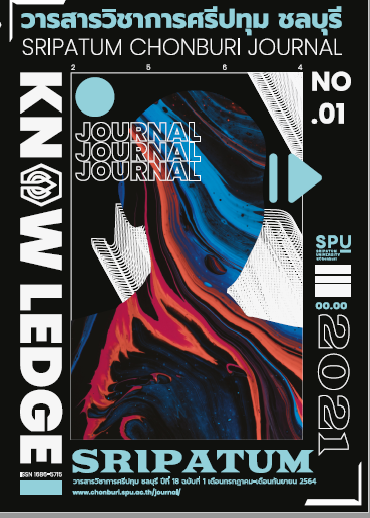HAPPY WORKPLACE FOR TOURISM DEVELOPMENT OF BANBANG KACHA COMMUNITY IN CHANTHABURI PROVINCE
Keywords:
happy workplace, tourism development, bang kacha communityAbstract
The purposes of this research were to assess the happiness level of villagers for the development of Ban Bang Kacha community-based tourism and to propose the guidelines of happy workplace for developing Ban Bang Kacha community-based tourism. The mixed method research is convergent parallel design. The research sample were collected by semi-structure interview from 15 stakeholders and the quantitative data were collected from 370 participations of Ban Bang Kacha community. The questionnaire was used as research instruments. The IOC test showed the average of 0.96. The research data were analyzed by descriptive statistic and content analysis. The main findings revealed that Ban Bang Kacha community has the potential for community tourism management due to the cooporation of villagers and the support of various agencies. This was consistent with the overall measurement of the happiness index of villagers in Ban Bang Kacha community-based tourism was high. Therefore, the two crucial approaches of developing Ban Bang Kacha community-based tourism: 1) the promoting happiness workplace for increasing efficiency of developing Ban Bang Kacha community-based tourism consisting of 4 dimensions: Happy Family, Happy Soul, Happy Society, and Happy Work-life, and 2) focusing on the development of happy workplace for achieving efficiency of developing Ban Bang Kacha community-based tourism consisting of 5 dimensions: Happy Body, Happy Money, Happy Brain, Happy Heart and Happy Relax.
References
มหาบัณฑิต กลุ่มวิชาการจัดการภาครัฐและภาคเอกชน, วิทยาลัยการบริหารรัฐกิจ มหาวิทยาลัย
บูรพา.
ชาย โพธิสิตา. (2559). ศาสตร์และศิลป์แห่งการวิจัยเชิงคุณภาพ (พิมพ์ครั้งที่ 7). กรุงเทพฯ: อมรินทร์
พรินติ้ง.
เทิดชาย ช่วยบำรุง. (ม.ป.ป.). แนวทางการปฏิรูปการท่องเที่ยวไทย (ออนไลน์). เข้าถึงได้จาก:
http://www.etatjournal.com/mobile/index.php/menu-read-tat/menu-2014/menu-2014-oct-dec/
227-42557-reform [2562, 17 ธันวาคม].
พรทิภา สมบูรณ์เลิศสิริ และจิราพร ระโหฐาน. (2556). รูปแบบองค์กรแห่งความสุขและคุณภาพชีวิต
ในการทำงานส่งผลต่อประสิทธิผลขององค์กร บริษัทไออาร์ พีซี จำกัด (มหาชน). วารสาร
พฤติกรรมศาสตร์เพื่อการพัฒนา, 5(1), หน้า 19-31.
รุ่งรัตน์ หัตถกรรม และคณะ. (2560). การพัฒนาองค์ประกอบและตัวชี้วัดความสุขมวลรวมของ
การจัดการการท่องเที่ยวโดยชุมชน. วารสารสหวิทยาการ, 1(1), หน้า 99-108.
ศิรินันท์ กิตติสุขสถิต และคณะ. (2555). คู่มือการวัดความสุขด้วยตนเอง HAPPINOMETER.
กรุงเทพฯ: โรงพิมพ์ธรรมดาเพรส.
ศูนย์เรียนรู้สุขภาวะ สำนักงานกองทุนสนับสนุนการเสริมสร้างสุขภาพ (สสส.). (2561). Happy 8:
ความสุขแปดประการ. กรุงเทพฯ: มิชชั่น อินเตอร์พริ้นท์.
สินธุ์ สโรบล (บรรณาธิการ). (2546). การท่องเที่ยวโดยชุมชน: แนวคิดและประสบการณ์พื้นที่ภาคเหนือ.
เชียงใหม่: สำนักงานกองทุนสนับสนุนการวิจัย.
องค์การบริหารการพัฒนาพื้นที่พิเศษเพื่อการท่องเที่ยวอย่างยั่งยืน (องค์การมหาชน). (2560). CBT ทำ
อย่างไรให้ยั่งยืน คู่มือการพัฒนาการท่องเที่ยวโดยชุมชน. กรุงเทพฯ: โปรดักเฮ้าส์ แอสเซอร์รี่.
อุมาวรรณ วาทกิจ. (2560). ปัจจัยสำคัญเป็นองค์กรแห่งความสุข กรณีศึกษา ธุรกิจโรงแรมระดับ 4-5 ดาว
ในเขตอำเภอเมือง จังหวัดขอนแก่น. วารสารวิชาการธรรมทรรศน์, 17(3), หน้า 121-131.
Diener, Ed, Scollon, Christie Napa, & Lucas, Richard E. (2004). The evolving concept of subjective
well-being: The multifaceted nature of happiness. In P. T. Costa & I. C. Siegler (Eds.),
Advances in cell aging and gerontology Vol. 15 (pp. 187-220). Amsterdam, Netherlands:
Elsevier.
Hampton, Mark P. (2005). Heritage, local communities and economic development. Annals of Tourism
Research, 32(3), pp. 735-759.
Yamane, Taro. (1973). Statistics: An introductory analysis (3rd ed.). New York, NY: Harper and Row.
Downloads
Published
Issue
Section
License
บทความทุกบทความเป็นลิขสิทธิ์ของวารสารวิชาการศรีปทุม ชลบุรี



